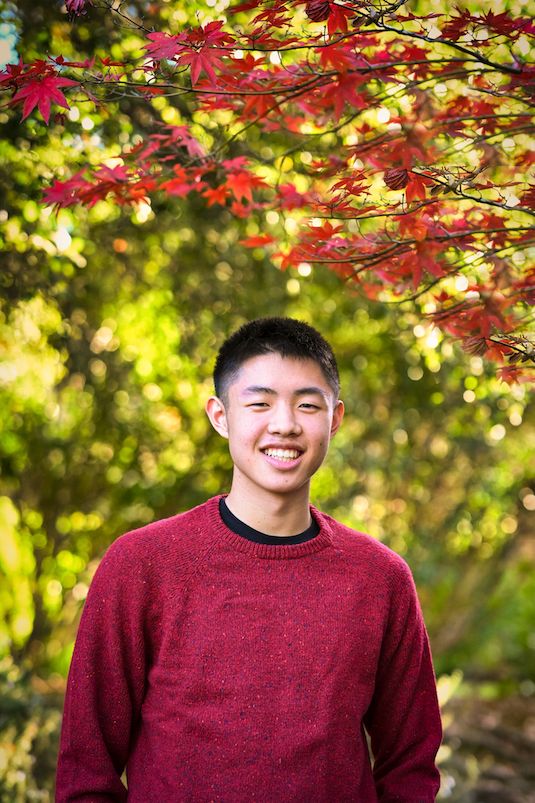Humans of Harker: Problem-solving the world
Jeffrey Kwan (12) approaches life with curiosity, thoughtfulness and a drive to improve
Provided by Jeffrey Kwan
“The fact that you keep having success where you keep actually being able to finish the puzzle, that keeps you doing it. It’s fun to have that moment where you can keep doing it. I’m good at recognizing when things are too hard, and then I stop doing things that are too hard. Then, I’m at a point where I can solve problems and it’s a rewarding experience,” Jeffrey Kwan (12) said.
With a resounding thud, the volleyball reflects off a passer’s platform and spins into the air, meeting the hands of the setter and then flying toward the left side of the net where Jeffrey Kwan (12), dressed in all black except for his green Harker volleyball t-shirt, waits, his eyes carefully tracking the trajectory of the ball. When the timing is right, he takes his approach, pulls back his arm midair and releases, swinging and hitting the ball in a whip-like motion, bouncing the ball into his opponents’ side of the court. Roars erupt from the bleachers as students of all grades. With this spike, Jeffrey wins another point for the seniors against the sophomores at the “Hustle for Muscle” volleyball tournament fundraiser for the Muscular Dystrophy Association hosted by Harker DECA and Harker spirit.
While Jeffrey is often known for being the captain of the varsity boys volleyball team or as someone who excels at competition math, his approach to life in terms of his curiosity, attention to detail and analytical qualities is just as noteworthy.
Ever since he was young, Jeffrey has enjoyed observing the world around him, gazing out the window during car rides as a kid, taking note of every little change in his surroundings, may it be a shift in the duration of a stoplight or a missed turn. Jeffrey’s sister, Melissa Kwan (‘18), recalls his attentiveness in a match against a Puerto Rican team from his 16s club volleyball season in which his team was up in the gold bracket as the national championship in its age group. In the final, deciding set, right as Jeffrey was preparing to serve, he noticed the other team was out of rotation, winning his team the point; they ultimately won the bronze medal at junior nationals.
“His attention to detail and his ability to know all aspects of the game was really amazing, and I think that was a tribute to how much he studies the game and how much he cares about the little things,” Melissa said.
Melissa also looks back on Jeffrey’s middle school days when he picked up the hobby of solving Rubix cubes, an activity that he later discontinued because of its formulaic and systematic nature.
“Not only did he manage to become really proficient in solving [Rubix cubes] himself, he also spread his energy to all of his friends,” Melissa said. “Whenever he dives into something, he always tries to learn as much as he can about it and strives to learn how to become really good at it, and he pretty quickly succeeds at it.”
When solving any problem ranging from a Rubix cube to a crossword puzzle to a competition math problem, Jeffrey finds joy in both the process of continually practicing increasingly more difficult problems and the satisfying moment of triumph.
“The fact that you keep having success where you keep actually being able to finish the puzzle, that keeps you doing it. It’s fun to have that moment where you can keep doing it. I’m good at recognizing when things are too hard, and then I stop doing things that are too hard,” Jeffrey said. “Then, I’m at a point where I can solve problems and it’s a rewarding experience.”
Jeffrey’s mindset about puzzles and games applies to his approach to competition math where he also looks for patterns and connects the mathematical concepts and problems he encounters into a “web” that he can then use to help solve future problems. For him, this process of truly understanding concepts, as in relating it to another problem he had solved previously and being able to explain the reasoning behind it, is paramount. As a member of the math club, Jeffrey strives to help other students achieve that same level of understanding, which he describes as an inherently very personal process.
“I actually think teaching math is more fun than doing math. If I think something is good, I really want someone else to have that feeling, like ‘wow, that was really clever’ or ‘that was amazing’. You put all these [examples] together, and you give them to your student. That’s the moment when they figure out how they’re all the same, when you transfer that intuition from yourself onto them … I really want them to feel the ‘aha’ moment,” Jeffrey said.
In addition to ascertaining the true meaning behind ideas, Jeffrey also naturally seeks to problem-solve and find the most efficient and effective way to approach every-day issues. Even when playing foosball in Shah, instead of leaving the play up to chance, Jeffrey formulates tactics, strategically sending the ball from his defensive line to the vanguard, aligning the ball’s path to a hole in the opponent’s defense and shooting straight into the goal.
“How can I maximize my chances? This comes out in volleyball a lot, not doing actual matches, but sometimes in practice we play weird drills and the coach will impose some rules [that aren’t] standard, and I always try to think about the rule and say, ‘What can we do to avert it? What strategy should we use?’,” Jeffrey said.
While math and volleyball seem to be two drastically different involvements since the former is highly individualistic and the latter emphasizes teamwork, Jeffrey has managed to take advantage of the dynamic between the two, taking lessons about perseverance and patience that he learned through volleyball and applying them to math competitions.
“Somehow, there’s a unified mindset. They work together because they’re different. Because I see both sides of the spectrum, I am able to understand better,” Jeffrey said. “If I didn’t play volleyball, I think I would be worse at math. I would perform worse in math competitions. I feel like because I play volleyball, I understand that I can work myself through a bad day. Doing one helps me understand the other better.
Along with the areas that Jeffrey heavily involves himself in, he also enjoys diving into other material, including Western philosophy books, self-improvement blogs, thought-provoking articles and more. No matter the subject area, he approaches his work with the same thoughtful and inquisitive drive.
‘The reason he finds [literature] so fascinating is because he’s still not very good at it. He considers himself not good at parsing the meaning of literature [and] trying to get good at that thing is really exciting for him because he’s already gotten good at a lot of things,” longtime friend Evan Cheng (12) said. “It’s pretty cool to see someone who’s already so accomplished not stand still and approach these other areas that he’s not as comfortable in and put his all into trying to get better.”
Upper school AP Physics C and Advanced Research teacher Chris Spenner describes Jeffrey’s investment in physics both in and out of class, making note of his strengths in math, physics and problem solving, but also recalling Jeffrey’s strong soft skills and sociability.
“He really listens to other people really well, and whether it’s younger students, older students, [or] adults; he’s just a really clear communicator,” Spenner said. “He really raises the bar. Without putting direct pressure on people, he leads by example, and he does such good work and he does the good work for good reasons, and I think people see that and adopt it for themselves.”
Like Spenner, Evan also emphasizes Jeffrey’s welcoming personality that eases and engages the people around him. By bringing up thought-provoking ideas in conversations, Jeffrey influences others to open their minds, but also takes every opportunity to gain knowledge from his peers and listen to their thoughts.
“He inherently believes that he has something to learn from everyone around him and that all the ideas around him have some sort of value in helping him build his world view as well and his understanding of himself, and I’d say that he’s probably the best listener that I know,” Evan said. “Conversations with him are always both wide-ranging and very introspective at the same time, which I certainly don’t get when I talk to most other people.”

Emily Tan (12) is the co-editor-in-chief of The Winged Post. This is her fourth year on staff, previously serving as the Winged Post features editor, and...


















![“[Building nerf blasters] became this outlet of creativity for me that hasn't been matched by anything else. The process [of] making a build complete to your desire is such a painstakingly difficult process, but I've had to learn from [the skills needed from] soldering to proper painting. There's so many different options for everything, if you think about it, it exists. The best part is [that] if it doesn't exist, you can build it yourself," Ishaan Parate said.](https://harkeraquila.com/wp-content/uploads/2022/08/DSC_8149-900x604.jpg)




![“When I came into high school, I was ready to be a follower. But DECA was a game changer for me. It helped me overcome my fear of public speaking, and it's played such a major role in who I've become today. To be able to successfully lead a chapter of 150 students, an officer team and be one of the upperclassmen I once really admired is something I'm [really] proud of,” Anvitha Tummala ('21) said.](https://harkeraquila.com/wp-content/uploads/2021/07/Screen-Shot-2021-07-25-at-9.50.05-AM-900x594.png)







![“I think getting up in the morning and having a sense of purpose [is exciting]. I think without a certain amount of drive, life is kind of obsolete and mundane, and I think having that every single day is what makes each day unique and kind of makes life exciting,” Neymika Jain (12) said.](https://harkeraquila.com/wp-content/uploads/2017/06/Screen-Shot-2017-06-03-at-4.54.16-PM.png)








![“My slogan is ‘slow feet, don’t eat, and I’m hungry.’ You need to run fast to get where you are–you aren't going to get those championships if you aren't fast,” Angel Cervantes (12) said. “I want to do well in school on my tests and in track and win championships for my team. I live by that, [and] I can do that anywhere: in the classroom or on the field.”](https://harkeraquila.com/wp-content/uploads/2018/06/DSC5146-900x601.jpg)
![“[Volleyball has] taught me how to fall correctly, and another thing it taught is that you don’t have to be the best at something to be good at it. If you just hit the ball in a smart way, then it still scores points and you’re good at it. You could be a background player and still make a much bigger impact on the team than you would think,” Anya Gert (’20) said.](https://harkeraquila.com/wp-content/uploads/2020/06/AnnaGert_JinTuan_HoHPhotoEdited-600x900.jpeg)

![“I'm not nearly there yet, but [my confidence has] definitely been getting better since I was pretty shy and timid coming into Harker my freshman year. I know that there's a lot of people that are really confident in what they do, and I really admire them. Everyone's so driven and that has really pushed me to kind of try to find my own place in high school and be more confident,” Alyssa Huang (’20) said.](https://harkeraquila.com/wp-content/uploads/2020/06/AlyssaHuang_EmilyChen_HoHPhoto-900x749.jpeg)



